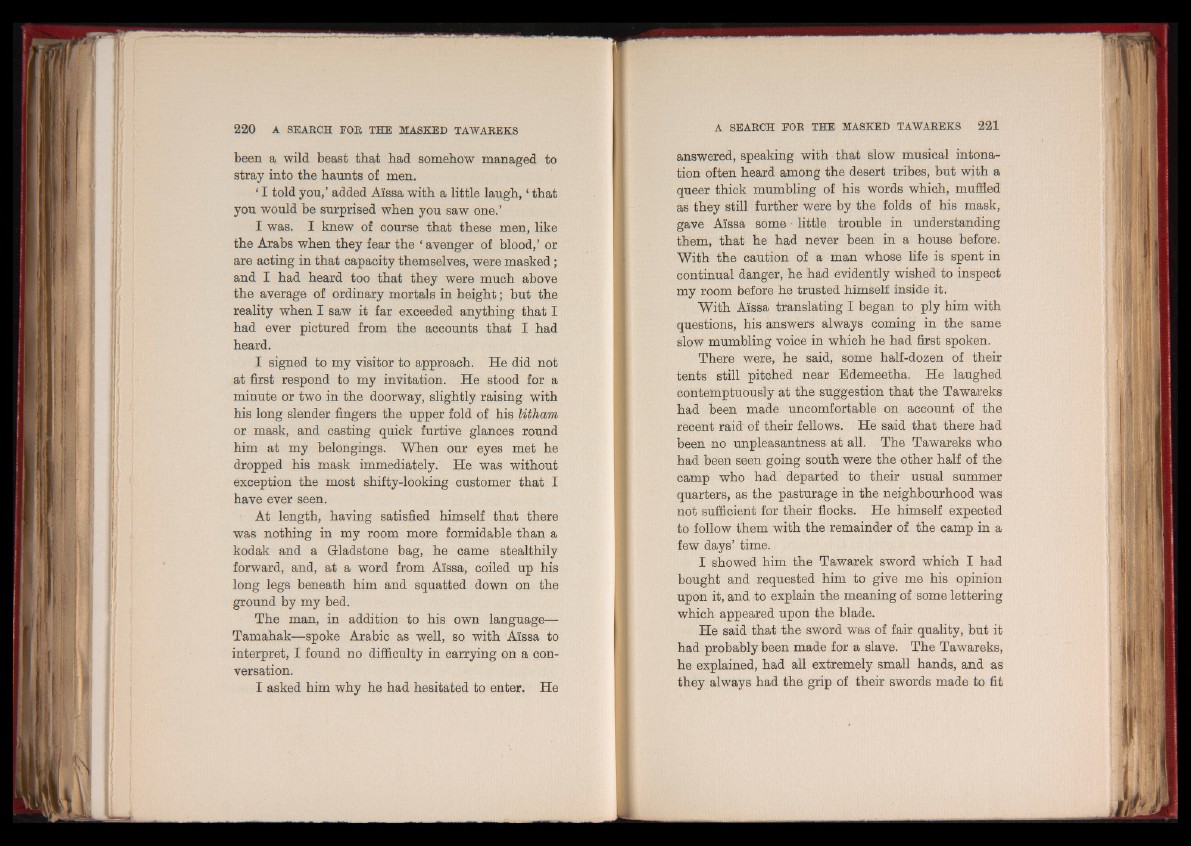
been a wild beast that had somehow managed to
stray into the haunts of men.
f I told you,’ added Aissa with a little laugh, * that
you would be surprised when you saw one.’
I was. I knew of course that these men, like
the Arabs when they fear the ‘ avenger of blood,’ or
are acting in that capacity themselves, were masked;
and I had heard too that they were much above
the average of ordinary mortals in height; but the
reality when I saw it far exceeded anything that I
had ever pictured from the accounts that I had
heard.
I signed to my visitor to approach. He did not
at first respond to my invitation. He stood for a
minute or two in the doorway, slightly raising with
his long slender fingers the upper fold of his litham
or mask, and casting quick furtive glances round
him at my belongings. When our eyes met he
dropped his mask immediately. He was without
exception the most shifty-looking customer that I
have ever seen.
At length, having satisfied himself that there
was nothing in my room more formidable than a
kodak and a Gladstone bag, he came stealthily
forward, and, at a word from Aissa, coiled up his
long legs beneath him and squatted down on the
ground by my bed.
The man, in addition to his own language—
Tamahak—spoke Arabic as well, so with Aissa to
interpret, I found no difficulty in carrying on a conversation.
I asked him why he had hesitated to enter. He
answered, speaking with that slow musical intonation
often heard among the desert tribes, but with a
queer thick mumbling of his words which, muffled
as they still further were by the folds of his mask,
gave Aissa some • little trouble in understanding
them, that he had never been in a house before.
With the caution of a man whose life is spent in
continual danger, he had evidently wished to inspect
my room before he trusted himself inside it.
With Aissa translating I began to ply him with
questions, his answers always coming in the same
slow mumbling voice in which he had first spoken.
There were, he said, some half-dozen of their
tents still pitched near Edemeetha. He laughed
contemptuously at the suggestion that the Tawareks
had been made uncomfortable on account of the
recent raid of their fellows. He said that there had
been no unpleasantness at all. The Tawareks who
had been seen going south were the other half of the
camp who had departed to their usual summer
quarters, as the pasturage in the neighbourhood was
not sufficient for their flocks. He himself expected
to follow them with the remainder of the camp in a
few days’ time.
I showed him the Tawarek sword which I had
bought and requested him to give me his opinion
upon it, and to explain the meaning of some lettering
which appeared upon the blade.
He said that the sword was of fair quality, but it
had probably been made for a slave. The Tawareks,
he explained, had all extremely small hands, and as
they always had the grip of their swords made to fit